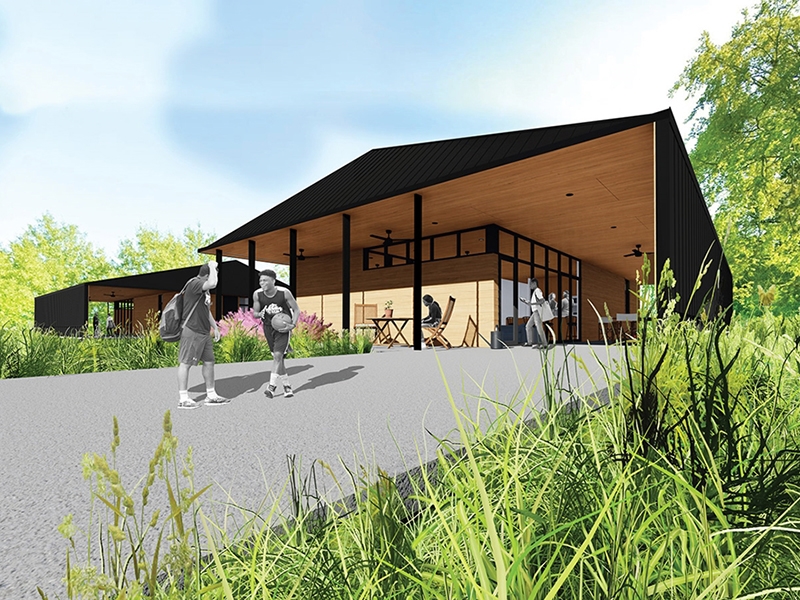Fay Jones School of Architecture and Design faculty members were once again honored by the Association of Collegiate Schools of Architecture in its 2024 Architectural Education Awards program. John Folan, department head and professor of architecture; Candice Adams, teaching assistant professor of architecture; and Emily Baker, assistant professor of architecture, all were part of teams that received 2024 Collaborative Practice Awards.
The Collaborative Practice Award recognizes ACSA's commitment to community partnerships in which faculty, students and neighborhood citizens are valued equally and that aim to address issues of social injustice through design.
Folan and Adams received the award for "Home for ALICE." Baker was part of an international team that received the award for "Crafting a Collaborative Curriculum: The Design Build Initiative."
"The recognitions of collaborative practice pedagogy are important to the Department of Architecture because they signal the relevance of sensibilities that are being fostered by faculty across the curriculum," Folan said. "Preparing students in a professional degree program carries the responsibility of providing an environment that affords students the opportunity to experience what will be encountered post-graduation. The practice of architecture is entirely a collaborative endeavor; these recognitions demonstrate that our students emerge from the program with that understanding."
In recent years, faculty members in the Fay Jones School have won additional ACSA recognition in the areas of the Distinguished Professor Award, Housing Design Education, Collaborative Practice, Faculty Design, Design Build, Practice and Leadership, and Timber Education — bringing the total honors to 21 since 2014.
The following are brief descriptions of the "Home for ALICE" and "Crafting a Collaborative Curriculum" projects.
Home for ALICE
In the Timberlands Region of Arkansas, nearly a quarter of the full-time essential workforce earns minimum wage, placing members of that population below the federal poverty threshold. More than 40% of households cannot afford necessities. This forces impossible choices and risky trade-offs. "Home for ALICE" focuses on individuals who are: Asset Limited, Income Constrained and Employed (ALICE). The individuals might be cashiers, waiters, childcare providers or any productive contributor to the community. The course aimed to answer several questions: Where does ALICE live? Who is ALICE? What can be done to break the cycle limiting ALICE's prosperity? How can ALICE be empowered?
These foundational considerations informed the development of an undergraduate seminar at the Fay Jones School that focused on the role designers can play in restoring dignity and justice through housing for rural communities in the Arkansas Timberlands Region.
The Urban Design Build Studio (UDBS), which Folan directs, employed a two-part pedagogical framework that leveraged extensive data collection with the aspiration of reshaping dialogue related to financial hardship.
The first component of work focused on who and where. It required students to explore the human condition, asset mapping, collaboration opportunities and context.
A subsequent and complementary component of work focused on what and how. This component required analysis of extant housing typologies, labor force dynamics, logistics of regional residential construction and culture.
The course was partially sponsored by a Weyerhaeuser Giving Fund grant. Research developed in the course supported grass-roots application findings through design. Students in the course were familiarized with local culture, community members and vital stakeholders providing a platform for the development and construction of a regionally specific, replicable housing prototype in the Timberlands region.
The "Home for ALICE" team comprised Folan and Adams.

“Acoustic Wall” was completed in a studio led by Emily Baker while teaching at the University of Sharjah in 2014. Image courtesy of Emily Baker.
Crafting a Collaborative Curriculum: The Design Build Initiative
Located on the Arabian Peninsula, the ongoing Design Build Initiative (DBI) at the American University of Sharjah presents an alternative model of full-scale pedagogy that privileges a collective approach to hands-on education woven into all curriculum levels.
The initiative is not for a single project, but an overarching faculty collaboration and institutional process designed to address shortcomings in the academic design-build model. The initiative features a diverse, evolving faculty collective working together within a supportive infrastructural framework. It is designed to overcome the excessive stress associated with design-build in which a single faculty juggles responsibility for all aspects related to teaching, client engagement, logistics, accounting, construction supervision and project delivery.
The DBI experiment exemplifies an easier way to conduct full-scale pedagogy. Working from a collaborative, holistic perspective, the program resolved issues and challenges of design-build programs. Collegial and administrative resistance, equipment and facilities, and funding and quality of work have all been addressed.
The new organizational framework highlights a team-based approach, curricular integration and fluid teaching assignments that dissuade individual entitlement or ownership. The large pool of faculty allows for a platoon system which allows faculty to alternate responsibilities. This keeps everyone fresh while also ensuring that participants teach non-DBI courses.
To date, 12 DBI faculty have led hands-on coursework. Projects have been recognized with three ACSA awards, three publications in the Journal of Architectural Education and nine American Institute of Architects design awards.
Along with Baker, the DBI team includes Michael Hughes, William Sarnecky, Gregory Spaw, Ammar Kalo, Patrick Rhodes, Kenneth Tracy, Juan Roldán, Marcus Farr, George Newlands, Camilo Cerro and Jason Carlow from the American University of Sharjah in Sharjah, United Arab Emirates; Daniel Chavez from Scarab Design in New Mexico; and Matt Trimble from Scenic City Nomads in Chattanooga, Tennessee. Hughes was formerly on faculty at the Fay Jones School from 2006 to 2010. He later created the Design Build Initiative (DBI) at the American University of Sharjah.
Honorees in the ACSA awards program were celebrated at the organization's 112th annual meeting, held March 14-16 in Vancouver, British Columbia.
Topics
Contacts
Tara Ferkel, communications specialist
Fay Jones School of Architecture and Design
479-575-4704,
Michelle Parks, director of communications
Fay Jones School of Architecture and Design
479-575-4704,
